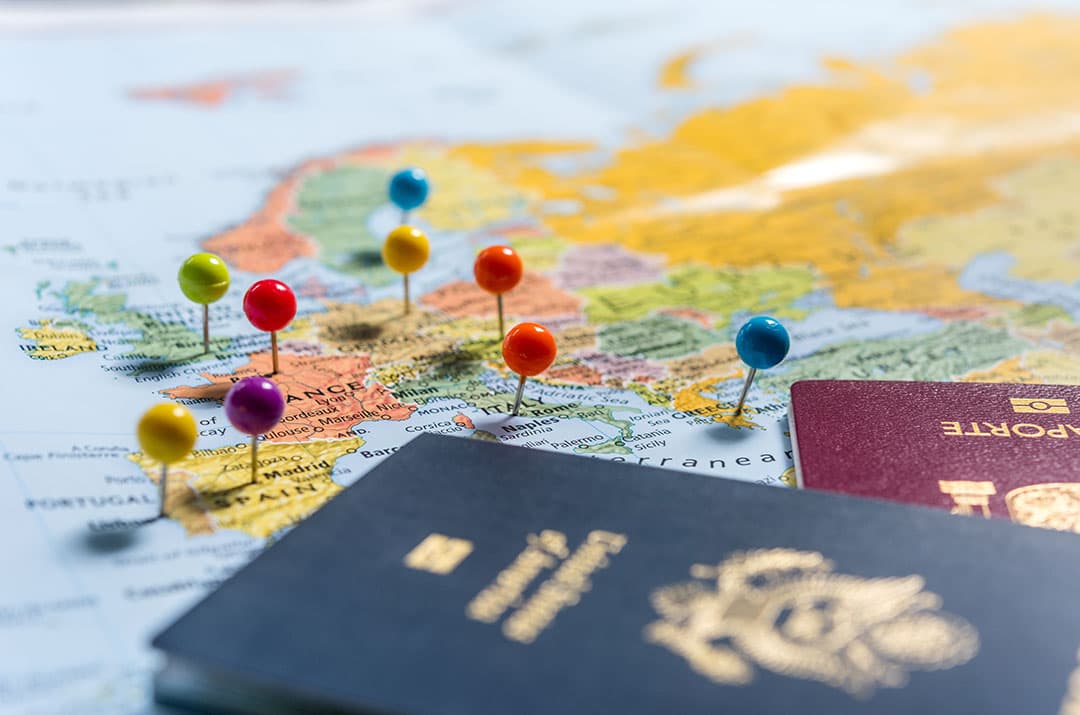- Home
- Blog
- Life Abroad
- How expats can save money while living abroad

How expats can save money while living abroad
New home, new budget? Here are our tips for saving money while living overseas.
٢١ أكتوبر ٢٠٢٠ — 6 min read
If you take just a couple of seconds to search “tips to save money”, you can easily find thousands of sources offering a variety of advice to help you make your budget and cut your expenses. But when you’re living abroad—and especially if you’ve just recently relocated to your new home country—it can be a little trickier to build your budget and practice smart spending when you need to readjust to a new currency, a new cost of living, and a new set of habits.
Making an overseas move can be pricey, but living abroad doesn’t have to be. With some research, planning, and smart shopping, you can ensure that you’ll save money in your new home country.
Keep an eye on the exchange rates
Of course you’ll want to pay attention to the exchange rates as you plan your move from one country to the next. If the rates are in your favor when you exchange your currencies, you could find yourself starting off in a much better spot, financially, than if you’d just left it to chance.
But even after you’ve moved, that doesn’t mean you’ll have no use for the exchange rates. Do you have friends and family back home? Do you have any debts or other bills that you’ll still need to pay? Are you planning on eventually moving back or even just visiting? There are many occasions that you might need to send money, and ensuring that the rates are in your favor when you do transfer can go a long way in protecting your bank account.
We encourage you to set up a Rate Alert for your chosen currency pair (or even several currency pairs). Instead of constantly checking the markets or just leaving it to chance, you’ll be notified once the rates are in your favor, letting you know as soon as it’s the best time to make your money transfer.
Pay attention to international taxes
Unfortunately, it’s not quite as simple as just paying taxes for the country that you’re currently living in. Depending on where you’ve moved (and where you’ve moved from), it’s very possible that you’ll be impacted by the tax systems of both countries, and not being prepared can have a significant impact on your finances.
Not every country is the same. For example, if you’ve relocated from India, you would not be required to pay taxes on income earned outside of India (however, if you are earning an income through an Indian profession or business, you be taxed on that income). On the other hand, the income of Americans living abroad is subject to US income tax, regardless of where they’re located or from whom they’re earning their income (though certain exclusions and credits do also exist).
Our advice? Don’t make any assumptions. Seek the advice of a qualified international tax specialist and be absolutely sure. You don’t want any surprises!
Live like a local, and compare everything
At first, moving to a new country feels like a vacation, and it can be easy to start acting like you’re on vacation. But while frequently eating out, buying lots of unnecessary things, and visiting touristy spots can be fun for a bit, it can quickly eat away—no pun intended—at your wallet. Think about it. In your old home country, you didn’t eat out for every meal and snack, right? (If you did, switching up these habits should be your first step.)
Immerse yourself in the culture of your new home. Plan your meals, cook for yourself, and visit the local markets and grocery stores. Look around at your new neighbors—particularly the locals—and see where they do their shopping and buy their necessities. It’s easy to feel overwhelmed and just head out to the first place you find, but like with anything else, comparison is key.
Additionally, be mindful of imported goods. Sure, we understand if you miss some things from back home and feel tempted to purchase them from expat shopping centers, but guess what: they’re going to fetch a higher price. Try to keep your nostalgia to a minimum, and embrace the local shops. You’ll save money, and you’ll get a better sense of the local culture.
Choose the right way to send money home or make international payments
At some point, you’re probably going to need to transfer money back to your old bank account or that of a friend or family member back home. Remember what we said earlier about comparison being key? Still applies here. Don’t just go out to the bank by default or the first provider that you find. Not all providers are created equal, and choosing the right one can make a big difference in the amount you’ll be paying.
Looking for that ideal money transfer provider? You’ve come to the right place. Here at Xe, we facilitate quick, simple, and cost-effective money transfers to 130+ countries around the world, with exchange rates informed by data from the live currency markets and fast transfer times (some money transfers take just a few minutes).
We also offer numerous options for sending money back home, and taking advantage of the options that suit your needs can further help your savings. Along with our simple spot transfers and the previously-mentioned Rate Alerts, we also provide:
. Happy with the current rates, but not ready to transfer just yet? Lock in today’s rate for a future transfer within the next 2 years. Then when you’re ready to send, you won’t need to worry about whether the rates are in your favor.
. Or would you rather wait for a better rate? Identify your ideal exchange rate, and once your target has been reached, the transfer will automatically initiate. If the markets are volatile and your transfer isn’t time-sensitive, this is a great way to ensure the rates will work for you.
. Do you have student loans, medical bills, or any other debts that require regular payments? Rather than worrying about making your transfer each month, set up a recurring series of regular payments at one locked-in exchange rate.
We hope that we’ve been able to provide you with some useful advice to manage your savings in your new home. If you ever need to make an overseas money transfer or international payment, we’d love to help you ensure that your money transfer is as quick, easy, and cost-efficient as possible. Log in or sign up to get started!
Related Posts

٤ نوفمبر ٢٠٢٤ — 5 min read

٨ أكتوبر ٢٠٢٤ — 2 min read

١٧ يوليو ٢٠٢٤ — 4 min read

١٧ أغسطس ٢٠٢٣ — 7 min read

١٧ أغسطس ٢٠٢٣ — 7 min read

١٧ أغسطس ٢٠٢٣ — 8 min read